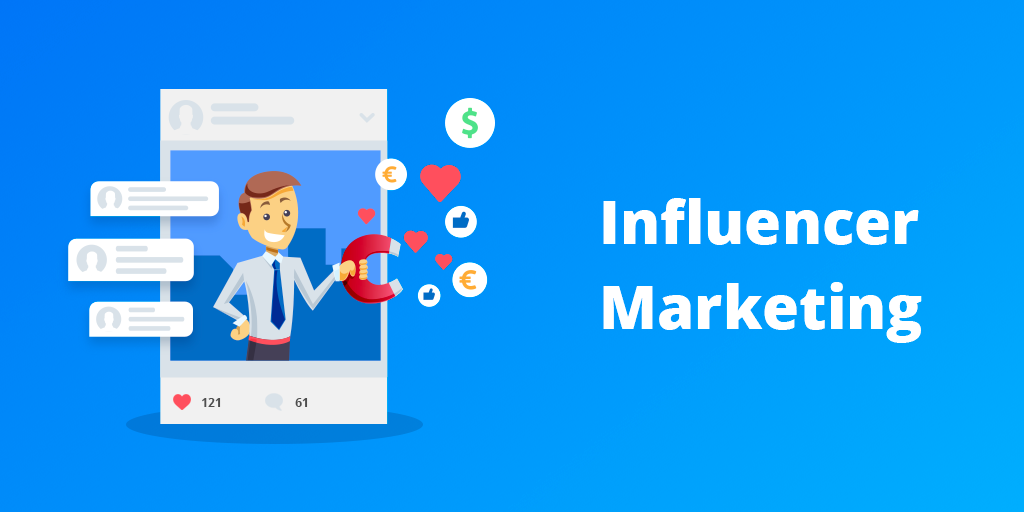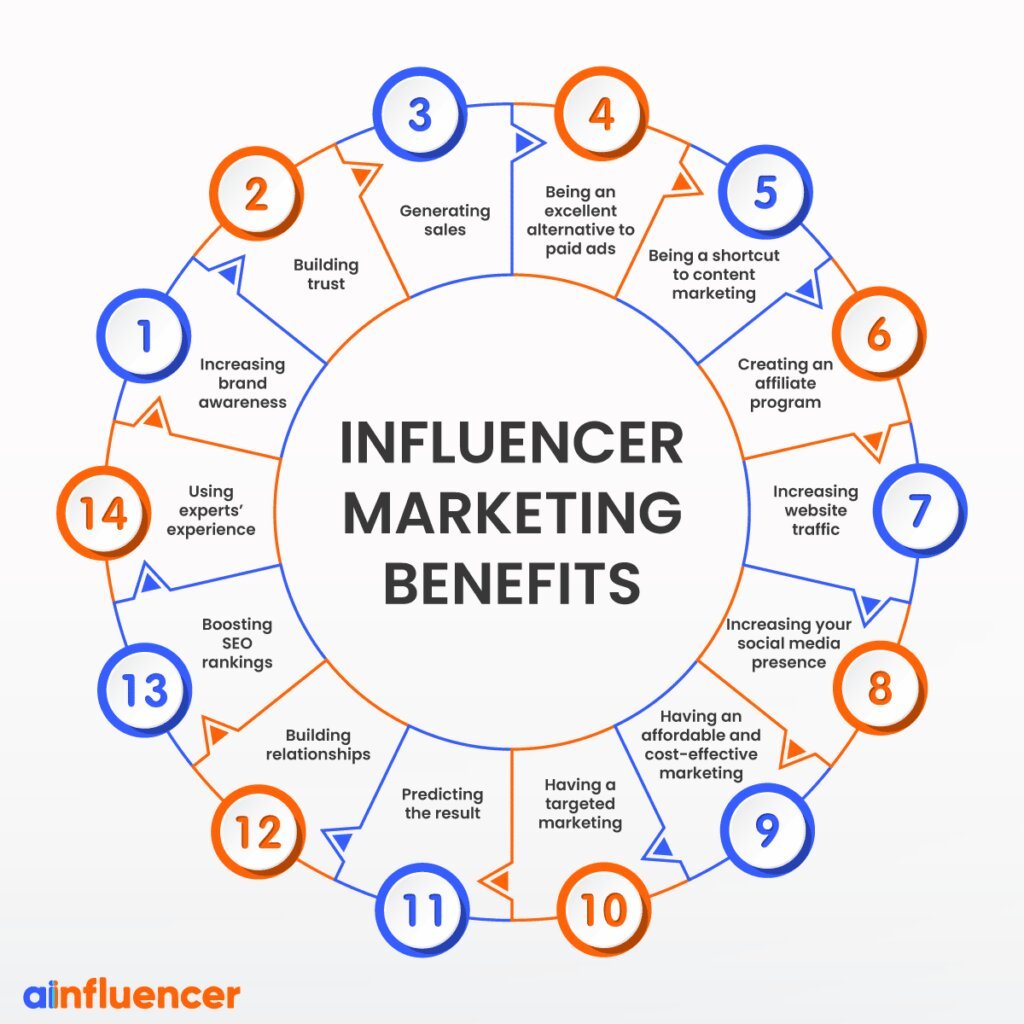
Influencer marketing has become a key strategy for many brands, but it’s not just for large companies. Small businesses and startups can significantly benefit from working with influencers to grow their brand awareness and customer engagement. According to a survey by Mediakix, 89% of marketers believe that influencer marketing’s ROI is comparable to or better than other marketing channels, making it an effective strategy for businesses of all sizes.
What is Influencer Marketing?
Influencer marketing involves partnering with individuals who have a dedicated following on social media to promote products or services. Influencers are categorized into different tiers based on their follower count:
- Mega-influencers (1,000,000+ followers)
- Macro-influencers (100,000 – 1,000,000 followers)
- Micro-influencers (10,000 – 100,000 followers)
- Nano-influencers (1,000 – 10,000 followers)
For small businesses, micro-influencers offer the best opportunity because they have highly engaged audiences and are more affordable compared to larger influencers.
Benefits of Influencer Marketing for Small Businesses
Influencer marketing offers several advantages for small businesses. It allows you to tap into the influencer’s established, loyal audience, increasing your brand’s visibility and credibility. This can be particularly effective for businesses with limited marketing budgets, as micro and niche influencers often offer more affordable promotion options while delivering targeted engagement. Influencers can create authentic content that resonates with potential customers, boosting trust and driving conversions. Furthermore, working with local or industry-specific influencers can enhance brand recognition in specific communities, making it easier to grow your customer base.

Why Micro-Influencers are Perfect for Small Businesses
Micro-influencers are typically more relatable and trusted by their followers. Studies have shown that micro-influencers have higher engagement rates than macro-influencers, and their audiences are more likely to act on their recommendations. For small businesses, this means:
- Affordability: Micro-influencers often accept lower fees or product exchanges, making them accessible even on limited budgets.
- Higher Engagement: Micro-influencers’ posts generate more comments, likes, and shares, which helps brands reach a highly engaged audience.
- Targeted Audiences: Since micro-influencers tend to focus on specific niches, small businesses can connect with the right audiences, ensuring that their message reaches potential customers who are genuinely interested.
How to Find the Right Influencers for Your Small Business
Finding the right influencer involves more than just looking at follower count. Small businesses should take the following steps:
- Define Your Target Audience: Know who your ideal customers are, including demographics such as age, location, interests, and behaviors.
- Search for Niche Influencers: Use platforms like Instagram, TikTok, or YouTube to find influencers who align with your niche. Tools like BuzzSumo and Upfluence can help identify influencers within specific industries.
- Analyze Engagement: Look beyond follower numbers and assess the influencer’s engagement rates (comments, likes, shares). High engagement shows that their followers are truly interested in their content.
- Check Authenticity: Ensure the influencer has a genuine following by reviewing their comments and interactions. Avoid influencers with a high percentage of fake or bot followers.
Influencer Campaign Ideas for Small Businesses
There are various ways small businesses can collaborate with influencers to drive engagement and sales. Some effective campaign ideas include:
- Product Reviews: Have influencers review your product or service and share their honest feedback with their audience.
- Giveaways: Partner with influencers to host giveaways where their followers can enter to win your products, which boosts brand visibility.
- Behind-the-Scenes Content: Show how your product is made or what goes into running your business, giving potential customers a closer look at your brand’s values.
- Collaborations: Collaborate with influencers to create exclusive content or limited-edition products, fostering excitement around your brand.
How to Measure the Success of Your Influencer Campaign
To ensure your influencer marketing efforts are delivering results, small businesses must track key performance indicators (KPIs) such as:
- Engagement: Track likes, shares, comments, and mentions generated by the influencer’s posts.
- Reach and Impressions: Measure how many people saw the posts and how far your brand’s message traveled.
- Conversions: Use tools like UTM codes and affiliate links to track sales and website visits generated from the influencer’s content.
- Return on Investment (ROI): Calculate how much revenue or brand awareness was generated compared to the cost of the influencer campaign.
Platforms like Google Analytics, Instagram Insights, and social media tracking tools can help you monitor these metrics.
What Are the Potential Drawbacks of Influencer Marketing for Small Businesses?
While influencer marketing offers many benefits, there are some potential challenges small businesses should be aware of:
- Fake Followers: Some influencers may artificially inflate their follower counts, resulting in poor engagement and wasted investment.
- Mismatched Audience: If the influencer’s followers don’t align with your target audience, your campaign may not yield the desired results.
- Costly Partnerships: While micro-influencers are generally more affordable, some may still charge high fees that are beyond the reach of small businesses with tight budgets.
How to Build Long-Term Relationships with Influencers
Establishing a long-term relationship with influencers can be more beneficial than one-off campaigns. Consider the following strategies:
- Maintain Communication: Keep in regular contact with influencers and provide updates on your brand’s progress.
- Offer Exclusive Deals: Give influencers exclusive access to new products or services, making them feel valued and appreciated.
- Collaborate Creatively: Involve influencers in brainstorming campaigns to create content that resonates deeply with both their audience and your brand’s mission.
Influencer Marketing on a Limited Budget
Small businesses with limited budgets can still take advantage of influencer marketing by:
- Offering Product Swaps: Instead of monetary payment, offer free products or services in exchange for a review or post.
- Collaborating with Nano-Influencers: Nano-influencers have smaller followings but often charge lower rates while maintaining strong engagement with their audience.
- Running Short-Term Campaigns: Focus on short-term, time-sensitive campaigns like product launches or holiday promotions to maximize impact without long-term costs.
Case Studies: Small Business Success Stories with Influencer Marketing
Many small businesses have successfully grown their brand through influencer marketing. For example:
- A small skincare brand partnered with beauty micro-influencers for product reviews and saw a 30% increase in customer engagement, according to a study by HubSpot.
- A local coffee shop collaborated with food bloggers to create Instagram posts, leading to a 15% boost in foot traffic within a month.
The Role of Authenticity in Influencer Marketing
Authenticity is the cornerstone of successful influencer marketing. Influencers who genuinely connect with their audience and honestly endorse products create more meaningful engagements, leading to better campaign outcomes. It’s important for small businesses to seek influencers whose values align with their brand.
The Future of Influencer Marketing for Small Businesses
The future of influencer marketing is evolving rapidly, with trends such as:
- AI-driven tools that help brands identify the right influencers.
- Niche platforms like TikTok and Twitch gaining popularity for micro-influencer collaborations.
- Data-driven decisions through improved analytics that provide deeper insights into audience engagement and campaign performance.
Legal Considerations for Influencer Marketing
It’s important to be aware of legal guidelines when engaging in influencer marketing:
- FTC Guidelines: Ensure that influencers disclose their partnerships and sponsorships clearly to their followers to comply with Federal Trade Commission (FTC) rules.
- Contracts: Always use written agreements to outline expectations, deliverables, and compensation for influencer partnerships.
How Influencer Marketing Enhances Brand Awareness and Customer Trust
Influencer marketing helps small businesses build trust with their target audience. Consumers are more likely to trust recommendations from influencers they follow and admire, leading to greater brand loyalty. Influencer Marketing Hub reports that influencer campaigns can generate up to 11 times higher ROI compared to traditional advertising, making it a powerful tool for small businesses.
Conclusion: Why Small Businesses Should Consider Influencer Marketing
Influencer marketing is an accessible and effective strategy for small businesses. By collaborating with the right influencers, businesses can increase brand visibility, engage their target audience, and boost conversions. With careful planning and execution, even small businesses with limited budgets can experience substantial returns on their influencer marketing efforts.
Need Help Growing Your Business? Let’s Work Together!
FAQs About Influencer Marketing for Small Businesses
1. What is influencer marketing, and how can it benefit my small business?
Influencer marketing is a strategy where businesses collaborate with individuals who have a loyal following on social media to promote products or services. For small businesses, it offers a cost-effective way to reach target audiences, increase brand awareness, and drive engagement, often yielding a higher ROI than traditional advertising methods.
2. What is the difference between micro-influencers and macro-influencers?
Micro-influencers typically have 10,000 to 100,000 followers and are known for their highly engaged and niche audiences. Macro-influencers have over 100,000 followers and cater to broader audiences. Micro-influencers are often more affordable and offer higher engagement rates, making them ideal for small businesses.
3. How do I find the right influencer for my small business?
To find the right influencer, focus on those who align with your brand’s values and target audience. Use social media platforms, influencer discovery tools like BuzzSumo or Upfluence, and analyze an influencer’s engagement rates, content style, and follower demographics to ensure a good fit.
4. How can I measure the success of an influencer marketing campaign?
Success can be measured using key performance indicators (KPIs) such as engagement rates (likes, shares, and comments), reach (how many people saw the content), conversions (sales or website traffic), and overall ROI. Tools like Google Analytics and social media insights can help track these metrics.
5. Are there any risks associated with influencer marketing for small businesses?
Yes, potential risks include working with influencers who have fake followers or mismatched audiences, which can lead to poor results. Additionally, not clearly defining expectations in advance or failing to comply with legal regulations (such as FTC disclosure rules) can create challenges.
6. Can influencer marketing work for small businesses with limited budgets?
Absolutely. Small businesses can work with micro or nano-influencers who charge lower fees or even accept free products in exchange for promotion. By focusing on short-term, strategic campaigns, small businesses can maximize their ROI without breaking the bank.